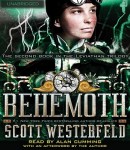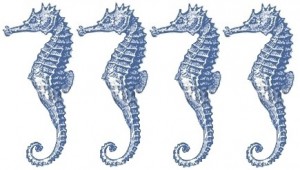I enjoy a good steampunk novel. Two years ago I read Leviathan by Scott Westerfeld, and it was high time to read the next book in the series.
 That book is Behemoth, and I listened to the CD version put out by Recorded Books and read by Alan Cumming. This series is aimed at the young adult market, grade 7 and up, and should appeal to either young girls or boys.
That book is Behemoth, and I listened to the CD version put out by Recorded Books and read by Alan Cumming. This series is aimed at the young adult market, grade 7 and up, and should appeal to either young girls or boys.
Whether you start the series by reading the first book or the second, Westerfeld transports you right into his world, and it’s different. Some of the World War I setting is the same as our world’s history–the countries are involved in the war, languages and accents, etc. However, in Westerfeld’s world, the main technologies of the 19th Century have evolved into two distinct branches. Some countries chose one path, some the other, and some a mix of both. One branch is mechanized, and includes the technologies of steam, gears, and even walking machines. This is termed “clanker” technology and is represented by Germany and Austria-Hungary. The other branch is the manipulation of DNA to form animals into creatures designed to be useful to man, including “message lizards” that can parrot human speech, and even living airships. These are the Darwinists and are represented by the United Kingdom and Russia. Other countries such as the U.S. and the Ottoman Empire employ mixtures of both branches.
Deryn is a young British girl who has chosen to disguise herself as a boy named Dylan and serve as a midshipman within the British airship Leviathan. She is in constant fear of being found out. Alek is a prince, legal heir to the throne of Austria-Hungary, but he cannot claim the throne yet and is driven into hiding from the Germans who want to kill him, as they did his father. Where Leviathan chronicled the separate adventures of the two teenagers, only having them meet near the end, in Behemoth, the two are together for much of the book when the airship arrives in Istanbul, giving a chance for their relationship to start to mature.
I found the world-building aspects of Behemoth to be excellent, with plenty of details to make Westerfeld’s world believable and interesting. Deryn’s language is peppered with expressions such as “Barking spiders!” to indicate surprise, “beasties” as a term for various Darwinist creations, and “gone pear-shaped” (an actual British idiom) meaning “gone wrong.” There’s plenty of action in the book including aerial attacks, secret underwater missions, and a revolutionary overthrow of a sultan featuring mechanical walking machines. The book’s characters are multi-dimensioned and complex, not steampunk tropes. Westerfeld never talks down to young readers, and the book includes an Afterward that separates real history from the alternative history of the novel. I found the book’s ending satisfying, which can’t always be said for first or second books of trilogies. Lastly, the narration by Alan Cumming is excellent; he makes it easy to distinguish the characters by their accents and tone.
The book is so good I am tempted to give it my highest rating. However, I find the plot to be rather contrived. Westerfeld is determined to have both characters join up with revolutionaries in Istanbul who are bent on overthrowing the Ottoman sultan. Their reasons for doing so seem out of character in the case of both Alek and Deryn. However, the target audience is unlikely to object to this and will accept the situation and read on.
 I’ll give this novel a rating of four seahorses using my trademarked seahorse rating scheme. Still, it is very close to five. I strongly recommend it for teenage boys or girls, who will find it easy to identify with the struggles of the characters. Alek and Deryn each want to be accepted, but they also yearn to discover their true selves; Westerfeld conveys these conflicts well. That’s the assessment of–
I’ll give this novel a rating of four seahorses using my trademarked seahorse rating scheme. Still, it is very close to five. I strongly recommend it for teenage boys or girls, who will find it easy to identify with the struggles of the characters. Alek and Deryn each want to be accepted, but they also yearn to discover their true selves; Westerfeld conveys these conflicts well. That’s the assessment of–
Poseidon’s Scribe
